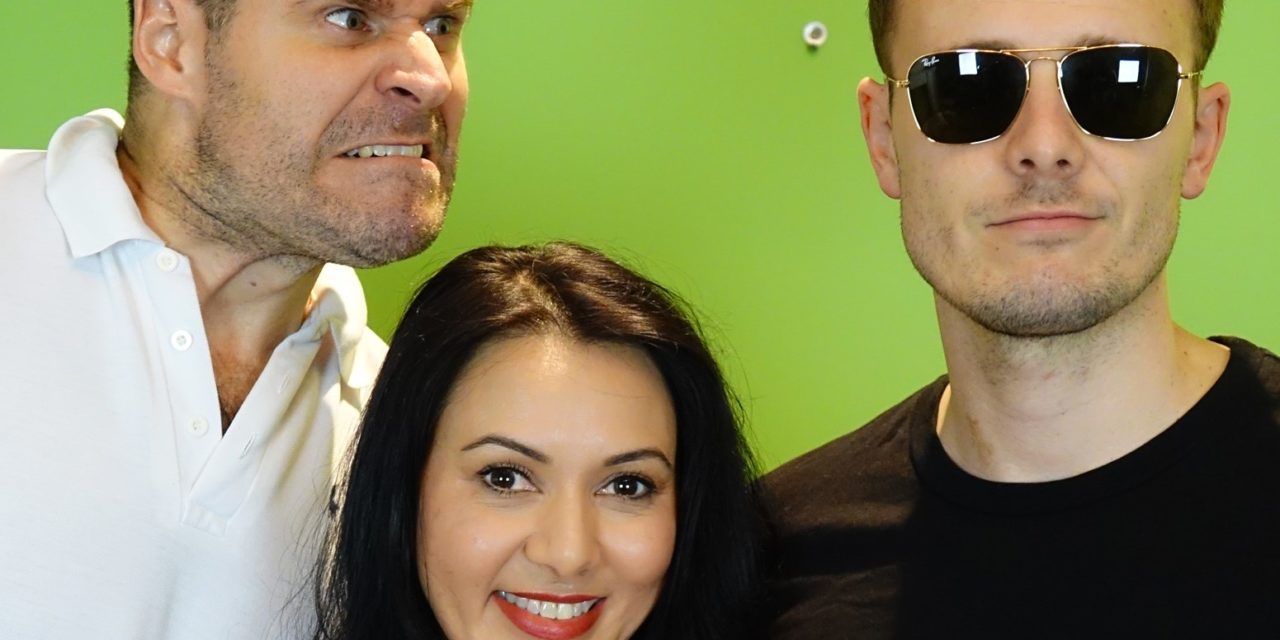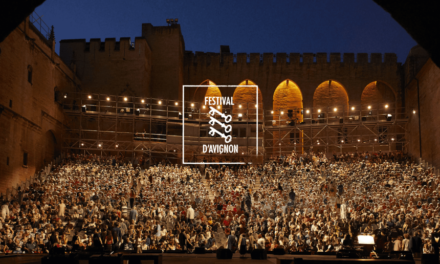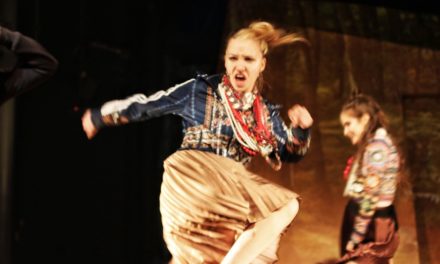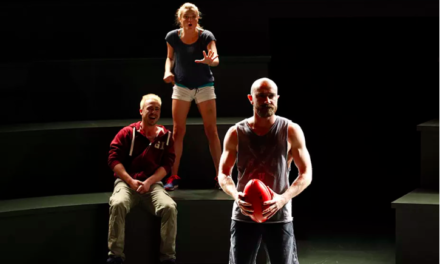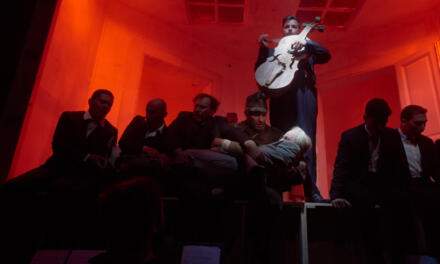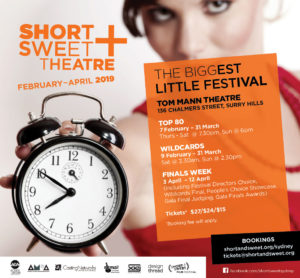
Short Sweet Sydney Theatre 2019
The biggest little theatre festival in the world is all grown up! The popular staple of the Sydney summer has reached its 18th year and is set to delight at Surry Hills’ Tom Mann Auditorium Thursdays through Sundays, beginning 7 February.
This year’s line-up of tasty treats has two programs that change each week, including a slew of local, regional, interstate, and international entries. Short+Sweet has spread the popular 10-minute format in theatre, dance, cabaret, and comedy across Australia and the globe with festivals as far afield as India, Malaysia, Dubai, and New Zealand. Its Hollywood festival is the world’s go-to showcase for actors, writers, and directors for stage and screen.
A host of new talent has boosted this year’s Sydney Theatre festival as a result of Short+Sweet’s New Directors’ Initiative, in which 40 participants were mentored by experienced directors that included a masterclass by Actors Centre Australia legend Dean Carey. The 2019 fest will again feature judges’ voting and the People’s Choice audience votes – all heading for the April Gala Finals.
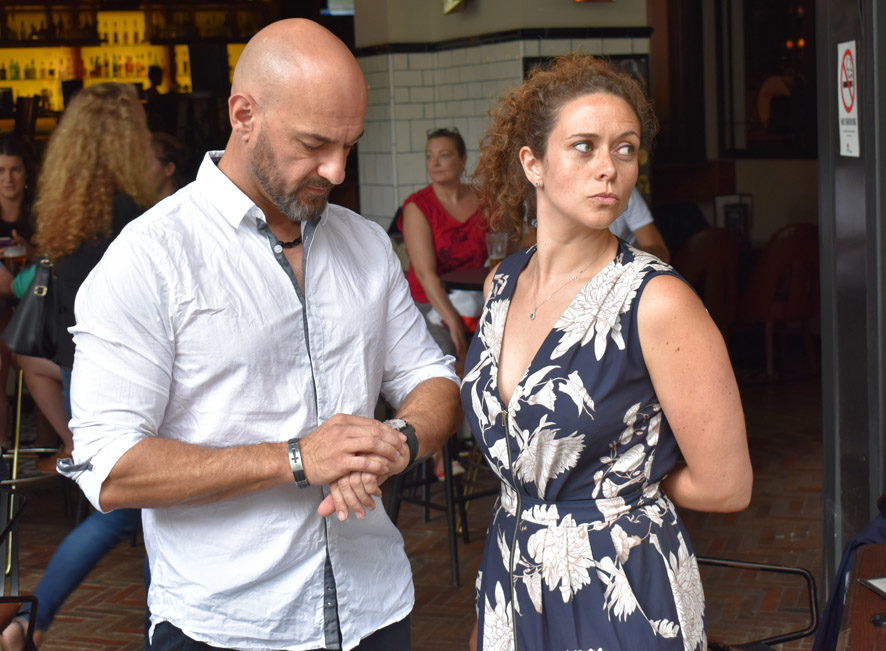
—Week 1 Top 80 Play: Waiting for the Godots. ©ShortSweetSydney.
Short+Sweet Theatre Sydney opens at the Tom Mann Theatre, 136 Chalmers Street, Surry Hills, on 7 February and runs through 27 April with both a Top 80 (Thursdays–Saturdays at 7.30pm, Sundays at 6.30pm) and a separate Wildcards program (Saturdays at 3.30pm, Sundays at 2.30pm). There will be 10 plays a night, with a new program each week. The gala finals take place in April.
Interview with Festival Director Sarah Purdue
Sarah Purdue, the new festival director, busy with preparations for the first week’s performances, took time to sit down and tell us about her experience as an actor, a director, a drama teacher, a budding filmmaker, and now a festival leader working in Sydney.
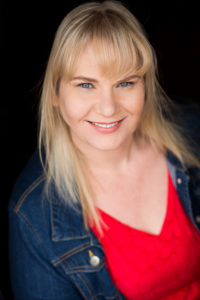
—Short+Sweet Sydney Festival Director Sarah Purdue. ©ShortSweetSydney.
S Lu: Hi, Sarah. You’ve trained in both Sydney and New York City. How would you describe Sydney’s theatre scene compared with New York’s?
Purdue: There are makeshift theatres and shows of various scales in every corner of the city in New York. While the standard of performances here is high, the opportunities for actors to do work for longevity is quite limited because Sydney is demographically a lot smaller.
S Lu: Where do you see Short+Sweet in this city’s theatre development?
Purdue: Short+Sweet plays a very integral role. Especially for first-time actors and directors, because this is a perfect platform to start a career and test their skills. I am excited to be presenting a diverse and engaging festival this year. We have artists this year representing the Indian and Chinese Australian communities, first-time directors who have recently completed their HSC (High School Certificate) and others with over 13 years’ experience in Short+Sweet. This festival is fast-paced and full of adrenaline. I hope that each week directors from different backgrounds can learn from each other through collaboration.
S Lu: How did you step into the role of festival director?
Purdue: I had a great time directing a play, Valentine’s Day, for Short+Sweet last year and developed a working relationship with the festival. So when the opportunity arose to jump in as a festival director, I took it. Having been a participant, now I try to mirror that experience and make a festival that is full of positive and inclusive experiences. I want everybody to feel that they belong to this family. As a leader, it’s my job to facilitate that culture.
S Lu: How do you select the plays and the directors?
Purdue: After the plays are submitted by playwrights, they are read and scored by a panel of accessors. After three to four rounds of assessment, the selected plays come to me, and they are categorized as either Top 80 or Wild Card. When the directors come, they generally have a conversation with me or submit an application form. It’s not about experiences but about how much they want to be involved. For first-timers, Wild Card is a great place to go because we’ve removed all the technical part so they can focus on the storytelling. Top 80 directors generally have a bit more experience, either at Short+Sweet or externally. The process of categorizing the plays and directors into two groups is very fluid, like putting a jigsaw together.
S Lu: You have introduced two themed weeks for this year’s programme: LGBTQIA Week, to coincide with Mardi Gras, and Women’s Week. What is your intention behind this change?
Purdue: In the span of my theatre career, I’ve noticed that women (in particular those in lighting, sound, directing, and writing) are grossly underrepresented. Being a female director myself, showcasing what women behind the scenes are capable of is essential.
It just happens that Week 5 aligns with International Women’s Day. So I thought to myself: what a wonderful way to highlight female participants in Short+Sweet. Also, we have a strong female crew, such as our production manager, Lydia Kelly, one half of our FOH team, Sonia Allan, and many female stage managers. The same for LGBTQIA: many friends in the industry identify with that community.
Without seeming tokenistic, it’s a way to celebrate them. For me, theatre is about human conditions: we all love, lose and laugh. It’s something we do together regardless of the color of our skin, our sexuality, our gender; we all feel the same things. To be able to put a focus on and allow the mainstream audience to relate to someone who is not necessarily in their community is essential.
S Lu: Are there any other themes you would like to explore?
Purdue: Absolutely. It would be fantastic to have a week of Indigenous stories in the future. Having spent much time in western Sydney suburbs with the Chinese and Indian Australian community and Syrian refugees, I would love to have a focus week of their stories.
S Lu: If you could give those who want to take part in the festival one piece of advice, what would it be?
Purdue: Relax. It’s only 10 minutes. Two things will happen: it will be very successful, and people will love it, or you will learn something, and it will make you a better director in the end. Some people get so caught up in the idea that it has to be perfect that they forget to have fun, and the Short+Sweet audience is very supportive.
S Lu: What are your discoveries and hopes as the festival director?
Purdue: It’s a lot of work. I’ve discovered that people are incredibly passionate and that community theatre is worthwhile to develop. I like to be able to put all the puzzles together, and it’s been a huge learning curve. Ideally, I would love to take this festival on the road and spread it across parts of Sydney that aren’t necessarily exposed to the festival.
This post was written by the author in their personal capacity.The opinions expressed in this article are the author’s own and do not reflect the view of The Theatre Times, their staff or collaborators.
This post was written by Shiya Lu.
The views expressed here belong to the author and do not necessarily reflect our views and opinions.

